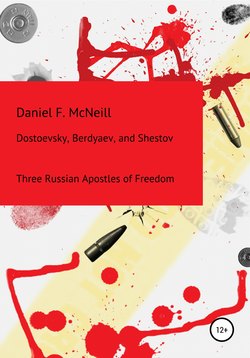Читать книгу Dostoevsky, Berdyaev, and Shestov. Three Russian Apostles of Freedom - Daniel Francis McNeill - Страница 6
Part One
Dostoevsky
6
ОглавлениеA main character in Dostoevsky’s last novel, The Brothers Karamazov, Ivan Karamazov, says that if there is no God then we are free to do anything. The European existentialist philosophers took up this idea and held that all human acts must result from free choices since in a godless universe human being has no foundation. The French philosopher Jean-Paul Sartre went so far as to say that man is “condemned to be free”. Dostoevsky held that freedom must be the supreme human value, but instead of denying the existence of God in order to act freely like some existentialists, he reasoned that finding God is possible if we reach a state of spiritual and intellectual freedom. The groundless freedom Dostoevsky felt in himself inspired him to create any kind of character ready to think or to do anything at all. Logical thought and free will result in human choices that create a world where human behavior is forced to follow a premeditated pattern dictated by reason. The more man accepts to live a life ruled by his reason and a knowledge arrived at using the same logic used by scientists, the less able he is to discover the world within him of God’s divine grace which has nothing to do with reason and knowledge. God can control everything but he will not. He will not interfere with man’s freedom to do and think whatever he wants. For Dostoevsky grace is a divine gift, a secret treasure, but total freedom is also a divine gift, perhaps a more important one. God gives humans his divine grace freely but he can not give it or he will not give it to people who live enslaved by a rationalized intentional way of living. Dostoevsky’s rootless creations are enslaved by a power that does not originate in God.
Raskolnikov fascinates us because he appears free in a way that is far beyond normal freedom. But his thoughts are transitory and negative. They rise up but are soon gone replaced by new thoughts and new ideas. His freedom grounded in his mind leads him nowhere, to an unreal inhuman state. He ultimately reveals that he is a fiction, a self freely created uselessly by a mind based on nothing. Sonya is free because the cruelty and the injustice of the world force her to be free. Insults, suffering, loathsomeness do not allow her mind to create for her some comforting fictitious but practical self based on nothingness. Everything has been taken from Sonya. The hatred and cruelty around her in the world have stripped her of normal human falsity and forced her to retreat into her soul. Because she must give up everything, she finds everything. The meek and the suffering inherit the world because the powerful of the world despise them and crush them. The world forces Sonya to flee into the nothingness in her soul where she discovers miraculously a secret treasure.
Some of Dostoevsky’s other characters, like Sonya, give evidence of secret treasure within them but most of them are groundless, on their own, disconnected from the normal world and also from the world of God. He constructed characters from nothing and delighted in watching them try to assert their extreme individuality among regular, normal people. He created a comedy so divine that the more he created living beings from nothing, the more he became sure that God was helping him create them in order to show the world that nothing can ever be as vital as a divine presence in the human heart. For Dostoevsky life for humans must be free and without any foundation because there is a God.
